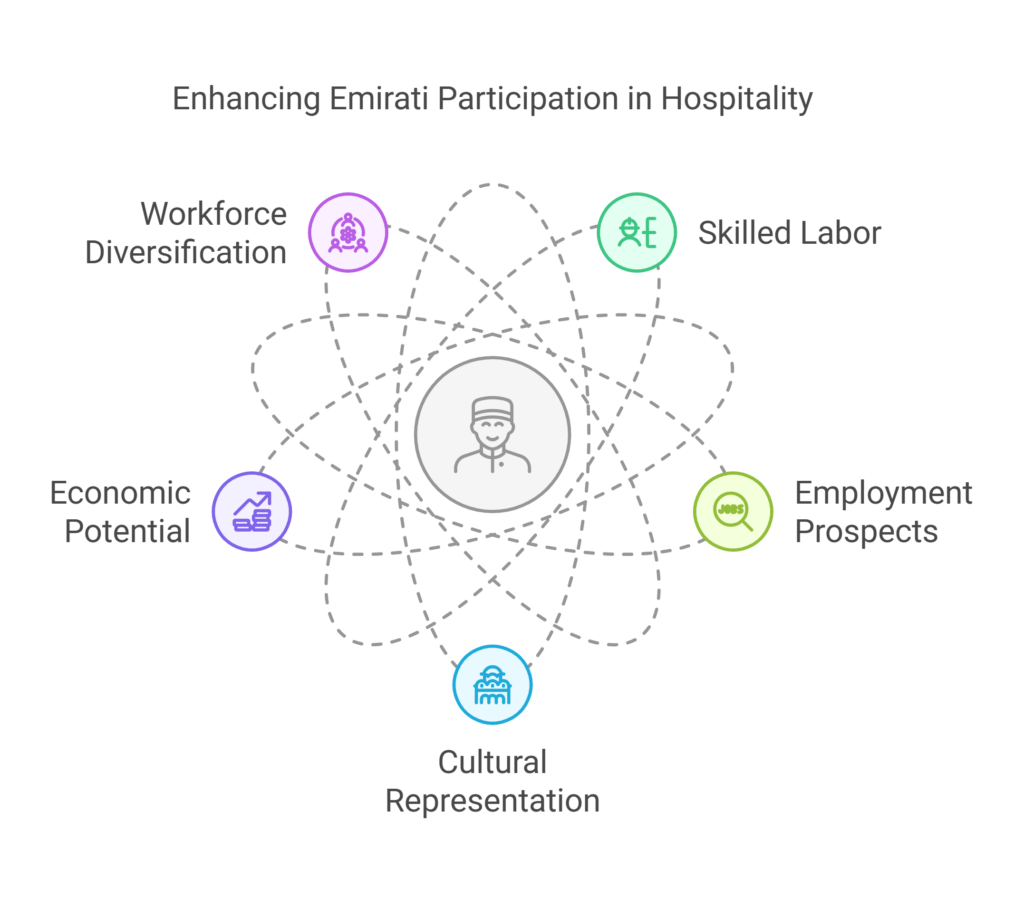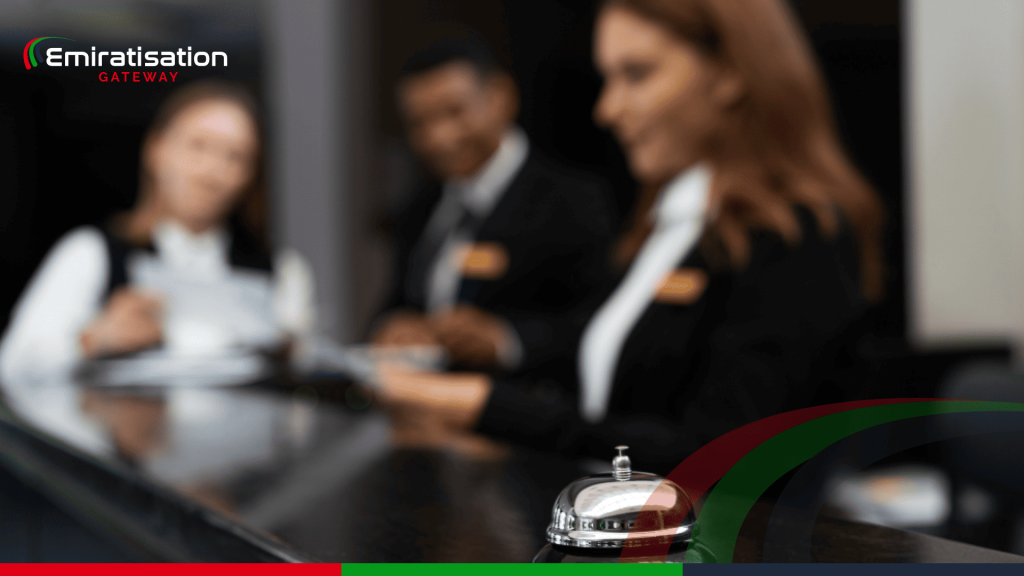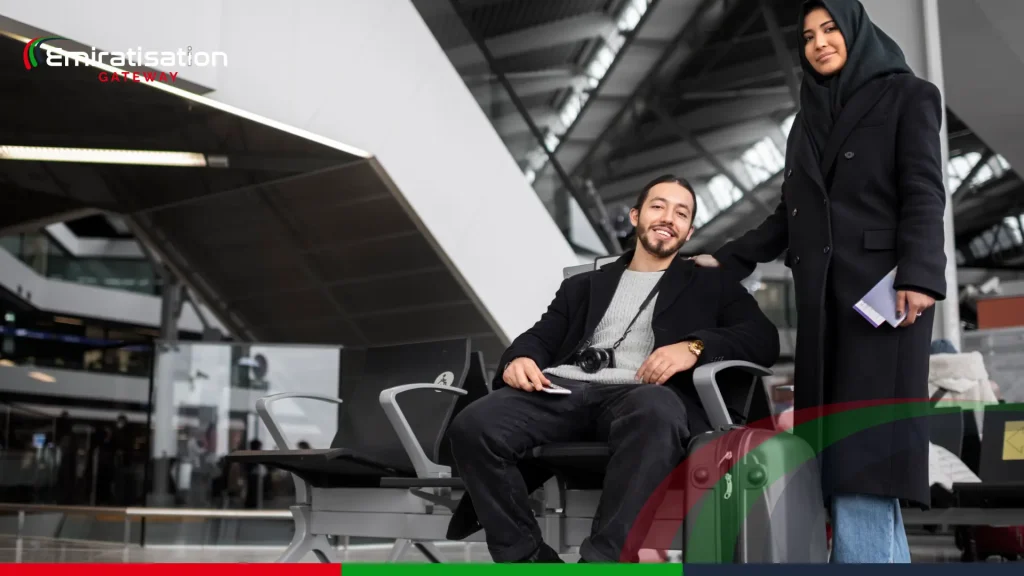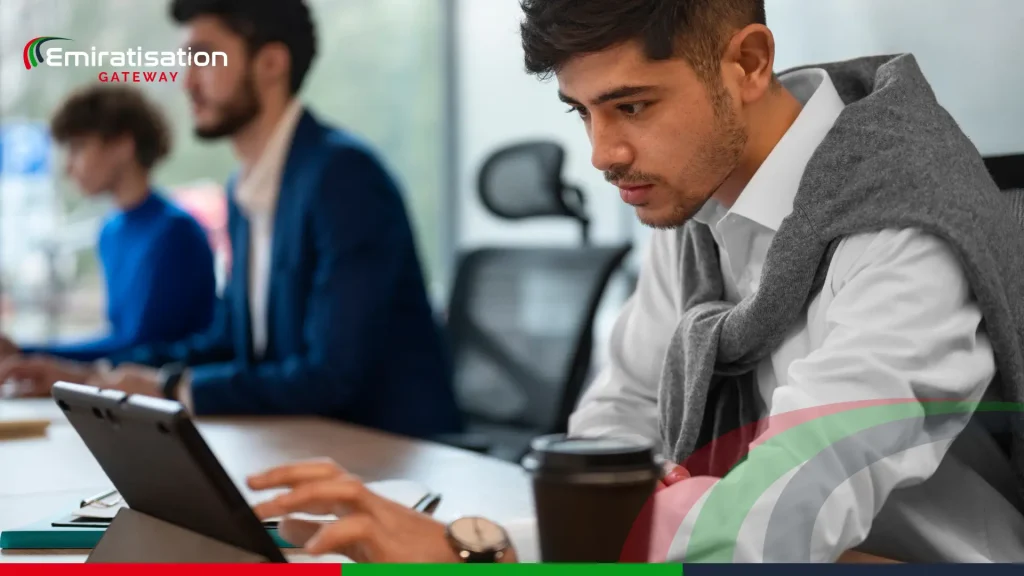The hospitality is a broad term that expands far and beyond than just the tourism and travel. It’s the entire industry that requires a proper workforce. Imagine traveling to a stunning nation but the individuals showcasing it are not native to the area. The tourist sector in the United Arab Emirates is expanding. The Emiratis must be at the forefront of hospitality if it is to reach its full potential. This is about more than simply jobs, it’s about enriching everyone’s experience and exhibiting Emirati culture. This article will discuss the Importance of Emiratisation in Hospitality Sector for both the sector and travelers like you!
The hospitality sector in the United Arab Emirates (UAE) is a country that takes prides on offering excellent experiences and services. Emiratisation is a fool proof strategy that enables Emirati citizens to take the lead in this fast-paced industry. It has gained significant attention in recent years. The Importance of emiratisation in hospitality sector will be examined in this article. It is designed along with particular attention paid to how it affects the workforce and the entire client experience.
Understanding Emiratisation:
Emiratisation is the government based initiative that promotes hiring of the local citizens in the workforce of both private and public sector. UAE already possesses the large quality of expats workforce who are serving effectively, belonging to different countries.
Why Focus on the Hospitality Industry?
The hospitality business in Dubai is growing, which makes it a desirable industry to think about for a number of reasons. Dubai is a popular travel destination that is expected to continue growing. This means that there will always be a need for lodging, dining, and other services related to hospitality. From budget travelers to luxury seekers, Dubai welcomes a broad spectrum of visitors. This makes it possible for hospitality companies to serve specialized markets and maintain a clientele throughout the year.
The government of Dubai actively encourages the travel and hotel industries. This can entail tax benefits, incentives, and streamlined rules that make starting and operating a firm simpler. Dubai often organizes big events, such as Expo 2020, which increases demand for travel and lodging.
Enhancing Employment Opportunities for Emiratis:

Skilled labor is essential to the tourism sector in the United Arab Emirates, however Emirati participation is still difficult to come by. This paper examines efforts to improve Emirati workers’ employment prospects in the hospitality industry. We can ensure that the industry represents the UAE’s distinctive cultural legacy and realize the full economic potential of the sector by cultivating a strong Emirati presence. This will result in a workforce that is more vibrant and diversified.
Creating Job Opportunities in Hospitality:
More Emiratis working in the hotel sector indicates a more robust and diversified economy with less dependence on a single sector. The hospitality sector boosts employment opportunities by bringing in qualified locals and filling job openings. Moreover, the involvement of Emiratis in hospitality enhances the bond between foreign visitors and Emirati culture, resulting in a more genuine and rewarding experience for them.
Addressing Unemployment Rates:
Dubai’s thriving hospitality sector offers a powerful solution to address unemployment rates. Hospitality is a job creation powerhouse. From luxury hotels to bustling restaurants, the industry requires a vast workforce across various roles. Hospitality offers opportunities for individuals with a wide range of skill sets. Whether it’s culinary expertise, customer service excellence, or event management skills, there’s a place for everyone. The hospitality sector is known for providing training and development opportunities.
This allows individuals to build valuable skills and progress within their careers. Dubai’s hospitality industry thrives on diversity. It fosters a welcoming environment for job seekers from various backgrounds, promoting cultural understanding and social integration.

Promoting Cultural Representation and Awareness:
The hospitality sector takes great satisfaction in providing visitors with an insight into various cultures. Making sure the real cultural representation is crucial in the United Arab Emirates (UAE), since tourism is a major industry. This paper investigates the ways in which Emiratisation—the deliberate incorporation of Emirati citizens into the labor force of the hospitality industry.
Reflecting UAE’s Culture in Hospitality:
Businesses and visitors alike stand to gain from showcasing UAE culture in hospitality. Visitors get a more fulfilling experience because of components such as music, art, and gastronomy that make them feel a part of the UAE’s history. This appreciation of culture has a positive economic impact by drawing tourists and assisting regional craftspeople. Lastly, showcasing Emirati culture makes workers proud of their work and improves employer branding, which makes the hospitality industry more dynamic and welcoming.
Enhancing Guest Experiences:
A workforce with a strong presence of Emirati staff allows guests to connect more meaningfully with Emirati culture. This can happen through interactions with staff, traditional cultural elements incorporated into the hotel or restaurant, or a deeper understanding of local customs.
Emirati staff can provide a more authentic perspective on the UAE, its traditions, and its way of life. This enriches the guest experience and fosters a sense of place. They are familiar with the local culture, can anticipate guests’ needs and preferences better, leading to a more personalized and enjoyable stay. Moreover, having Emirati staff on board allows for better communication with Arabic-speaking guests, removing any language barriers and ensuring a more comfortable experience.
Economic Benefits for the UAE:
The impact on the economic sector of hospitality industry is also greater. Contributing to the prosperity and progress of the country, the hospitality and emiratisation work together in harmony. Find out the factors below that enhance and maintain the economic landscape of the country.
Boosting the Local Economy:
The UAE’s hospitality industry, particularly strong in Dubai, acts as a major booster for the country’s economic landscape. There are factors that contribute to the economy factor.
- Hospitality creates a wealth of employment opportunities, reducing unemployment and injecting income into the local economy. This fosters a skilled workforce across various roles.
- A thriving hospitality sector lessens reliance on oil and gas, diversifying the UAE’s economy. This attracts foreign investment, boosts trade, and fuels overall growth.
- Tourists bring in foreign currency through spending on hotels, restaurants, and entertainment. This money circulates within the UAE, stimulating businesses and boosting government revenue.
Sustainable Economic Development:
One of the most important sectors for attaining sustainable economic development is the hospitality sector. How to do it is as follows:
- Job Creation & Community Development: The hospitality industry creates a multitude of jobs that strengthen local communities and promote economic inclusiveness. This increases revenue, raises living standards, and lowers the rate of poverty.
- Economic Diversification: The hotel business reduces reliance on a single industry by luring tourists. The economy benefits from this diversity and becomes more resilient to shocks from the outside world.
- Environmental Sustainability: Greener economies are bolstered by environmentally conscious hotels and resorts that place a high priority on eco-friendly measures including water conservation, renewable energy, and local sourcing.
Building a Skilled Workforce:
A workforce makes or breaks any company. This way, a team of individuals with proper skillset is highly important. This can include proper training and polishing talented skills.
Training and Development Programs:
A significant driving force behind training and development initiatives is the hospitality sector. This is due to the industry’s need for continual improvement, a broad spectrum of capabilities, and steady evolution. T&D programs meet these objectives by providing possibilities for promotion, supplying personnel with the requisite knowledge, and keeping them abreast of current developments. In the end, this results in happier customers, better services, and a more prosperous hotel industry.
Fostering Talent and Leadership:
The hospitality sector in the United Arab Emirates provides a fertile environment for leadership development and talent cultivation. For a brief explanation, see this:
- Skill Development: A variety of professions within the hospitality industry require specialized talents. Training courses give people the tools they need to succeed in their chosen fields.
- Continuous Learning: Because the industry is ever-changing, T&D programs make sure staff members are knowledgeable about the latest trends and best practices, which promotes a culture of lifelong learning.
- Career Advancement: Opportunities for reskilling and up skilling help workers advance in their professions and assume leadership roles.
- Employee Satisfaction: Putting money into the development of staff members raises morale and retention, which results in a more committed and competent workforce.
Enhancing Corporate Social Responsibility (CSR):
Introducing the emiratisation in hospitality sector, boasts the corporate social responsibility among the individuals. The code of conduct and healthy environment are sure to be enhanced by promoting stronger connection.
Aligning with CSR Goals:
Everyone gains when the hospitality sector aligns with CSR. Eco-friendly methods reduce their negative effects on the environment, and social responsibility is promoted by treating workers properly and participating in the community. This strategy reduces expenses and boosts employee satisfaction in addition to enhancing brand recognition and drawing in eco-aware tourists. In general, CSR benefits society, the environment, and the hospitality sector.
Community Engagement and Support:
Hotel emiratisation in the UAE goes beyond employment. The community is strengthened by it. Hotel workers may serve as positive role models for young people, and customers can learn about Emirati culture from them. Emirati employees source from local firms, which benefits them. Furthermore, volunteer programs foster a sense of community spirit and social responsibility among Emirati employees. Emiratisation, in short, strengthens the social fabric of the United Arab Emirates.

Overcoming Challenges in Emiratisation:
To ensure the regulation of emiratisation, you are sure to face challenge and risk along the way. Knowing them beforehand will let you utilize the right measures.
Identifying Common Challenges:
There are various obstacles in the way of expanding Emirati worker participation in the United Arab Emirates. These are a few of the most typical ones:
- Skills Mismatch: Acquired knowledge and skills may not perfectly match industry demands. Job applicants from the UAE might not have the specialized training or work experience needed for a particular role.
- Salary Expectations: Compared to the private sector, public sector jobs frequently offer more alluring benefits and salary packages, which is why some Emiratis give preference to government work.
- Work-Life Balance: Certain Emiratis’ professional decisions may be influenced by cultural conventions or preferences around work-life balance.
- Retention Challenges: Limited career growth options inside the organization are only one of the reasons why businesses may find it difficult to keep Emirati personnel after recruiting them.
- Perceptions by Employers: Unconscious prejudices against the qualifications or work ethic of Emiratis may exist among certain employers.
Strategies for Success:
The following are some crucial tactics for bringing Emiratisation to the UAE’s hotel sector:
- Skills Development Programs: Work with educational institutions to create focused programs that give Emiratis the credentials and particular skills needed for careers in hospitality.
- Internships and Mentorship Programs: Offer possibilities for internships in hotels and resorts along with guidance from seasoned experts. This provides young Emiratis with real-world exposure and career assistance.
- Draw Attention to Diverse Career Paths: Highlight the range of job paths available in the hospitality industry, including management, event planning, culinary arts, and guest services. This increases the allure and draws in a larger group of talented Emiratis.
- Competitive Salary and Benefits: To attract more people to professions in hospitality, offer attractive remuneration packages that are comparable to those in the public sector as well as benefits that take into account Emirati preferences.
- Flexible Work Schedules: To accommodate Emirati cultural norms or preferences for work-life balance, think about providing flexible work schedules or part-time choices.
- Opportunities for Career Advancement and Empowerment: Clearly define professional growth pathways for employees in your hotel company. Give Emirati workers the chance to grow professionally and assume leadership positions.
- Disprove Perceptions: Employers in the hospitality industry can combat unconscious prejudice by enrolling in diversity and inclusion training programs. This guarantees that Emirati applicants are assessed according to their qualifications and merit.
- Cultural Sensitivity Training: To promote a more welcoming and courteous work atmosphere, incorporate cultural sensitivity training for both Emirati and non-Emirati personnel.
Conclusion:
Emiratisation is the lifeblood of the UAE’s hotel sector. It brings in new talent, boosts the local economy, and encourages visitors to have a more culturally diverse experience. Hotels and resorts may create a win-win scenario for companies, workers, and the UAE at large by embracing emiratisation.






